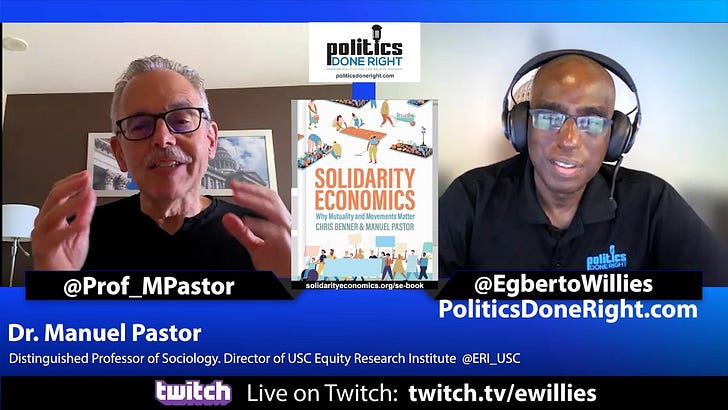Dr. Manuel Pastor: How Musk, Billionaires, and Individualists freeload off our economy.
Dr. Manuel Pastor, Distinguished Professor of Sociology and American Studies & Ethnicity at the USC, clarified that the economy is ours and that billionaires like Musk and individualism harm it.
A quick but important note before reading this prescient article
As of today, we have 9.87 thousand followers and 102 supporting (paid) subscribers. Misinformation funded by the deep pockets of our Oligarchy floods the internet. We are using all of our platforms on-air, online, and in publications to counter that. We ask that you invest the equivalent of less than a coffee to ensure we can keep doing this. Please invest in a Democracy that serves all of us by becoming a paid subscriber. It comes with many benefits.
Dr. Manuel Pastor exposes Musk & Billionaires.
In a recent edition of Politics Done Right, the host welcomed Dr. Manuel Pastor, a distinguished professor of Sociology and American Studies and Ethnicity at the University of Southern California (USC). Dr. Pastor, who currently directs the Equity Research Institute at USC, has long criticized the myth of the lone, swashbuckling capitalist hero. His recent article in Common Dreams, titled "Elon Musk Shows Us Why Individuals Can't Save the World," delves into how billionaires like Musk benefit from public investments while promoting a narrative of rugged individualism and self-made success.
The Myth of the Self-Made Billionaire
As told by many, the story of Elon Musk is one of individual brilliance and entrepreneurial spirit. Musk is often depicted as the quintessential modern capitalist hero, a visionary who has disrupted multiple industries and amassed a fortune through sheer genius and hard work. However, Dr. Pastor argues that this narrative is deeply flawed and overlooks the significant role of public support and investment in Musk's success.
Dr. Pastor points out that SpaceX, Musk's private space exploration company, heavily relies on federal contracts for its operations. Similarly, Tesla, Musk's electric vehicle company, survived its first 12 years largely due to government policies that allowed it to sell emissions credits to other automakers who couldn't meet environmental standards. Furthermore, public mandates to combat climate change, not just consumer demand, drive the increasing market for electric vehicles.
Public Investments and Private Profits
Dr. Pastor emphasizes that the success of individuals like Musk is not solely due to their entrepreneurial skills but also significantly dependent on public investments and policies. The public sector creates markets and provides the necessary infrastructure for these industries to thrive. For instance, federal investments in research and development have been crucial for technological advancements that companies like Tesla and SpaceX benefit from.
This public-private dynamic is often obscured by the myth of the self-made billionaire. The narrative of rugged individualism suggests that economic success is solely the result of individual initiative and market forces, ignoring the crucial role of government intervention and public funding. This myth misrepresents reality and undermines the importance of collective efforts and public investments in driving economic growth and innovation.
The Real Beneficiaries of Public Policies
One of the key points Dr. Pastor makes is that public policies designed to promote environmental sustainability and technological innovation often end up benefiting private corporations disproportionately. For example, the federal policies that enabled Tesla to sell emissions credits effectively created a market for electric vehicles, allowing the company to make significant profits. However, these profits are privatized, while the public, who funded the research and policies, does not receive a direct return on their investment.
This dynamic is not unique to the tech industry. Other sectors, such as pharmaceuticals and healthcare, rely heavily on public funding for research and development. Yet, the profits from these innovations are largely captured by private corporations, perpetuating economic inequality and limiting the public's share in the benefits of these advancements.
Challenging the Dominant Narrative
Dr. Pastor argues that it is essential to challenge the dominant narrative of individualism and market supremacy. He advocates for a more nuanced understanding of the economy as a collective enterprise shaped by public policies and investments. This perspective emphasizes the importance of public goods and the need for equitable distribution of the benefits of economic growth.
In his book, "Solidarity Economics: Why Mutuality and Movements Matter," Dr. Pastor explores these ideas in greater depth. He argues for a shift in how we talk about the economy, from viewing it as an impersonal system governed by immutable laws to recognizing it as a human creation that can be shaped to serve the common good. By adopting a language of "our economy" instead of "the economy," we can highlight the role of collective efforts and public investments in driving economic success.
The Role of Progressive Movements
Dr. Pastor also underscores the importance of progressive movements in advocating for economic justice and equity. He calls for greater power for workers, communities, and environmental advocates to ensure that economic policies benefit everyone, not just the wealthy few. By building solidarity and promoting mutual interests, progressive movements can challenge the dominance of corporate interests and push for policies that prioritize the well-being of all people.
Conclusion
The conversation with Dr. Manuel Pastor sheds light on the often-overlooked role of public investments and policies in the success of so-called self-made billionaires like Elon Musk. By debunking the myth of rugged individualism and highlighting the importance of collective efforts, Dr. Pastor advocates for a more equitable and just economy. His insights call for reevaluating our economic narratives and a renewed focus on public goods and shared prosperity. This perspective is crucial for addressing the pressing challenges of our time and building a more inclusive and sustainable future.
Can we count on you to help us reach our goal of 100 new paid subscriptions by month’s end?
The other side has big donors and everyday citizens who invest heavily in platforms that lie and misinform. All we have is you. So, please invest in our media outlet by clicking the subscribe button below to become a paid subscriber. You won’t miss that coffee, but it will make a difference in our politics as we spread the truth about our policies and progressive politics. All paid subscribers get to read my five books on this platform and all subsequent books I write. They will also be privy to subsequent incentives.








